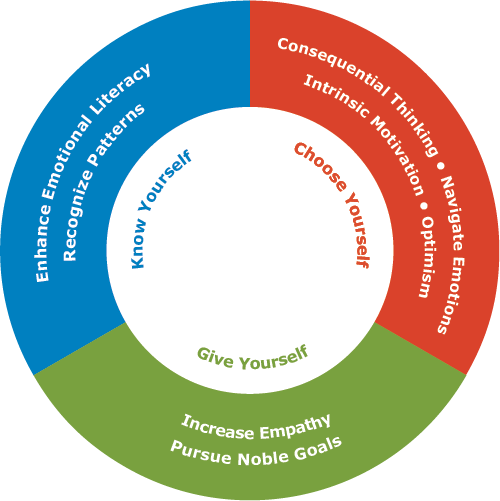“What’s Important Here?” Anxiety’s Valuable Message
This is a follow up to my article on anxiety, Name and Reframe: 2 Simple Strategies to Overcome Anxiety with EQ.
Warren Phillips, a clinical psychologist and President of Transformative Workplace Solutions, a Six Seconds Preferred Partner, brought up a great question after reading Name and Reframe: 2 Simple Strategies to Navigate Anxiety. He asked the following: While reframing anxiety as excitement works in some cases, like before a job interview, are there other situations when this would be a mistake?
The answer is yes, absolutely.
He brought up a couple great examples:
Imagine you are going to a meeting with your boss, and you know you have done something wrong, so you feel anxious.
Or…
Imagine you are going home and you are worried your partner, who struggles with alcohol, is drunk.
In these cases, naming the emotion may still be helpful. But reframing it as excitement? Not so much. Those are times when it’s appropriate, necessary and even helpful to feel anxiety. Your anxiety is telling you something valuable. Can you think of an example in your life when you have felt anxious and it wouldn’t be appropriate to reframe it as excitement?
And in those situations where reframing it as excitement isn’t the answer, what’s an emotionally intelligent way to navigate that anxious feeling and use it to take purposeful steps forward?
What is anxiety trying to tell you?
Before we talk about ways to navigate anxiety, let’s circle back to a basic question: What’s the message of anxiety?
There’s an unclear risk.
And sometimes, of course, that anxious feeling is spot on. Something we care about IS at risk.
When you should be anxious… what can you do?
So when we feel this type of anxiety that shouldn’t be reframed, Phillips and Six Seconds CEO Josh Freedman recommend asking another question: “What about this situation feels important to me?”
Or, “What is the outcome I am really looking for?”
Then the anxiety can be reframed as an alert, Phillips says, that something important is happening. “Part of Six Seconds approach that I love,” he told me via email, “is the exploration of emotions and the important messages they share with us. Emotions help us determine what’s important in our lives so we can explore how we might get there or what approach we might want to take.” The anxiety serves as a signal to evaluate priorities and start going through the KCG process of considering what you really want and all your options for getting there. Emotions, even challenging ones like anxiety, are data – and can be a catalyst for positive growth.
What does this look like in action?
Consider the example of heading into a meeting with your boss when you have failed to get an important task done or lost a client account.
Phillips says he would go through a 4-step process to help a client navigate anxiety in this situation:
- Help them notice and name the anxiety.
- Encourage them to consider the message the feelings or thoughts are sharing with them. (“Perhaps how important this job is to me, how much I enjoy it or don’t enjoy it, how important it is to be organized, what self-limiting belief keeps me from reaching out for help when I’m overwhelmed, etc.”)
- Use that information to come up with ways of handling the situation better the next time.
- Utilize ways of navigating the anxiety (such as mindfulness, deep breathing, distancing methods, or self-compassion) to enter the meeting with as much focus and clarity as possible.
There are no good or bad emotions. Emotions are data.
A big thank you to Warren for sharing his insight. Reframing anxiety as excitement does work, and in some cases, it’s the way to go. But in other cases, your anxiety is trying to tell you something valuable, and it should be accepted as is, and be a catalyst to help you learn and grow.
Check out this video from Six Seconds’ CEO Josh Freedman about what happens to a stressed out brain. It adds further evidence for why it’s essential to go through this process of actively looking at the bigger picture and recognizing options when we’re feeling anxious.
What’s new in emotional intelligence?
Emotions As a Motivation Supercharger: 3 Essential Questions to Feel Motivated
What makes motivation… motivating? Three powerful questions, a free worksheet, and powerful ways to strengthen energy from within (which we all need, especially when work/life feels challenging)
The Power of Gratitude: How Focusing on the Good Changes Your Brain—and Your Life
Gratitude is more than a warm feeling. It’s a practice that changes how we relate to the world. How can you tap into the power of gratitude?
Overcoming Urgency: How Emotional Intelligence Helps You Slow Down and Focus on What Truly Matters
If you ever feel stuck in urgency mode, emotional intelligence offers a way out — and a way back to what matters most.
Integrated Emotions: Feelings Are Allies
What if all our feelings had value? Many people see emotions as “good” or “bad” — which leaves us in a constant state of internal struggle against our own feelings. Here’s a framework to rethink feelings as valuable signals about what’s important.
The Six Seconds Model of Emotional Intelligence: What It Is and How to Use It (+ PDF)
What is emotional intelligence and how do you practice it? Explore the Six Seconds Model of Emotional Intelligence to improve your life and relationships.
Plutchik’s Wheel of Emotions: Feelings Wheel
Grow your emotional literacy with Plutchik’s Wheel of Emotions. Then download the free Practicing Emotional Intelligence eBook to go deeper!
- Pursue Noble Goals in the Six Seconds Model of EQ - July 29, 2023
- Increase Empathy in the Six Seconds Model of EQ - July 26, 2023
- Exercise Optimism - July 24, 2023






PS. This reminds me of that old Buffalo Springfield song, “For What Its Worth.” Maybe the positive value of anxiety is like the song, saying to us:
There’s something happening here
What it is ain’t exactly clear…
Important considerations here Michael, thank you.
Anxiety is complex because it’s a single word that is used to cover a wide gamut of experiences… from real threat to imagined, from existential crisis to unease… from a debilitating clinical condition to a healthy response.
For ALL these stories, though, there’s value in listening to ourselves (and one another) and considering the wisdom that lives within. Emotions can be confusing and complex… and even when it’s hard (especially when it’s hard), clearly hearing our own feelings is a powerful step forward.